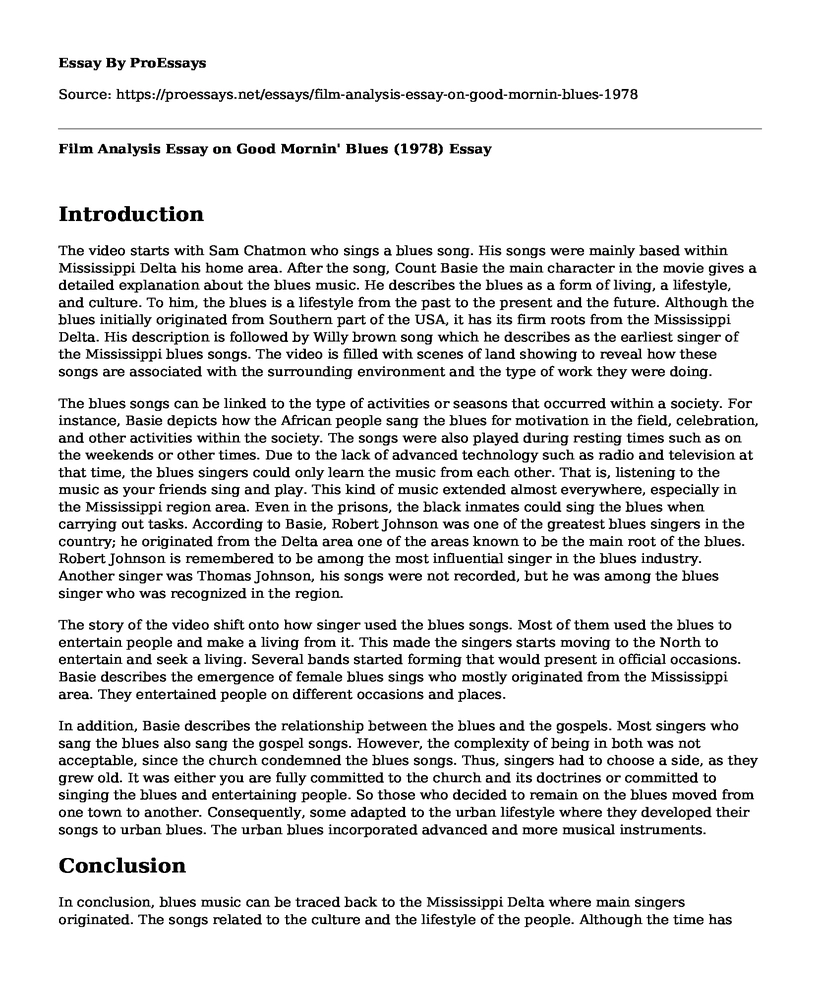Introduction
The video starts with Sam Chatmon who sings a blues song. His songs were mainly based within Mississippi Delta his home area. After the song, Count Basie the main character in the movie gives a detailed explanation about the blues music. He describes the blues as a form of living, a lifestyle, and culture. To him, the blues is a lifestyle from the past to the present and the future. Although the blues initially originated from Southern part of the USA, it has its firm roots from the Mississippi Delta. His description is followed by Willy brown song which he describes as the earliest singer of the Mississippi blues songs. The video is filled with scenes of land showing to reveal how these songs are associated with the surrounding environment and the type of work they were doing.
The blues songs can be linked to the type of activities or seasons that occurred within a society. For instance, Basie depicts how the African people sang the blues for motivation in the field, celebration, and other activities within the society. The songs were also played during resting times such as on the weekends or other times. Due to the lack of advanced technology such as radio and television at that time, the blues singers could only learn the music from each other. That is, listening to the music as your friends sing and play. This kind of music extended almost everywhere, especially in the Mississippi region area. Even in the prisons, the black inmates could sing the blues when carrying out tasks. According to Basie, Robert Johnson was one of the greatest blues singers in the country; he originated from the Delta area one of the areas known to be the main root of the blues. Robert Johnson is remembered to be among the most influential singer in the blues industry. Another singer was Thomas Johnson, his songs were not recorded, but he was among the blues singer who was recognized in the region.
The story of the video shift onto how singer used the blues songs. Most of them used the blues to entertain people and make a living from it. This made the singers starts moving to the North to entertain and seek a living. Several bands started forming that would present in official occasions. Basie describes the emergence of female blues sings who mostly originated from the Mississippi area. They entertained people on different occasions and places.
In addition, Basie describes the relationship between the blues and the gospels. Most singers who sang the blues also sang the gospel songs. However, the complexity of being in both was not acceptable, since the church condemned the blues songs. Thus, singers had to choose a side, as they grew old. It was either you are fully committed to the church and its doctrines or committed to singing the blues and entertaining people. So those who decided to remain on the blues moved from one town to another. Consequently, some adapted to the urban lifestyle where they developed their songs to urban blues. The urban blues incorporated advanced and more musical instruments.
Conclusion
In conclusion, blues music can be traced back to the Mississippi Delta where main singers originated. The songs related to the culture and the lifestyle of the people. Although the time has brought changes to the blues, it is impossible to forget the origin of the blues nor the original songs sung by great influential singers. Besides, blues music had influenced the lifestyle of most individuals and sang by many people.
Cite this page
Film Analysis Essay on Good Mornin' Blues (1978) . (2022, Nov 15). Retrieved from https://proessays.net/essays/film-analysis-essay-on-good-mornin-blues-1978
If you are the original author of this essay and no longer wish to have it published on the ProEssays website, please click below to request its removal:
- Crash: The Next Great Depression? TV Movie Plot Summary
- Paper Example on Information Sharing
- Movie Analysis Sample on The Death Note
- Reggae Music: Impact on Society - Essay Sample
- Data-Sharing Soars: Benefits & Risks of Social Media - Essay Sample
- Essay Example on Karate Kid: From Imitating Bruce Lee to Mastering Martial Arts
- Hacksaw Ridge - Movie Analysis Essay







